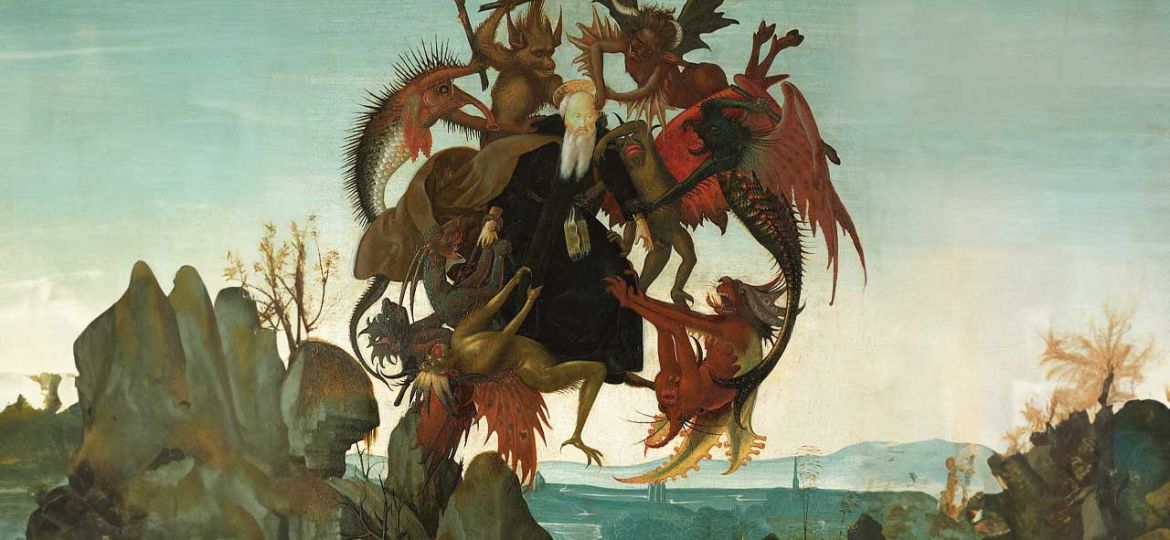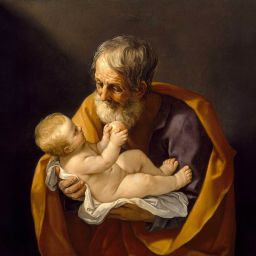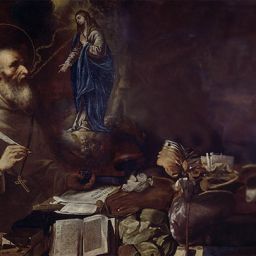
Thematic Issue (Inspiring Faith)
by Fr. Neil J. Roy, STL, PhD; SAGI Chaplain & Director, Inspiring Faith*
*Saint Albert the Great Institute for Science, Faith & Wisdom
St. Anthony of Egypt, Abbot, Confessor (250-356)
Words of Wisdom: In a church building crowded with many members of the faithful, the Gospel is proclaimed before, and heard by, most of the congregation. Nevertheless, there may be a few people in that gathering who hear something in the Gospel or the homily that they had never before noticed or heard in quite the same way. By some mystery of God’s generous grace, they hear the words of the Gospel speaking to them in a personal and direct way, such that they had never before experienced. Consequently, significant conversions take place amidst the sacred liturgy.
A RICH YOUNG MAN WHO WAS GREATLY INSPIRED BY CHRIST’S WORDS
One such conversion to a deeper Christian life took place when a young man of eighteen years named Anthony, who was from a wealthy and highly prosperous family near Memphis in Egypt, walked into church one day and heard from the pulpit the words of Our Lord: “If thou wilt be perfect, go, sell what thou hast, give the money to the poor; and come follow me. And thou shalt have treasure in heaven.” These words originally had been spoken to a rich young man who, sadly, turned away from the Divine Master’s challenge and invitation. The full account occurs in Matthew 19:16-26.
However, the rich young man Anthony heard those words as though the Lord had addressed them directly to him. Anthony had been considering for some time the dialogue between Christ and the rich young man in reference to his own situation. When Anthony heard these words being proclaimed as he entered the church on this occasion, he took it as a confirmation of a generous impulse stirring within him. He now knew that he had to answer this calling, this vocation.
Anthony’s parents had died six months earlier, leaving Anthony and his younger sister orphans. Anthony was now responsible for both raising and educating his sister. He therefore entrusted her to the care of nuns in a local convent and provided for her future. As for himself, Anthony left his comfortable world, sold his land and property, and went out to the edge of his city to live on his own.
He lived first in a cemetery to test whether he could endure a life of loneliness. There he faced terrible temptations, particularly of the flesh. The constant reminder of the shortness of life provided by the tombs in the cemetery helped him to overcome these trials. In a vision, an angel encouraged Anthony to persevere and to live in great austerity. Anthony prayed the the psalms faithfully each day; he ate only bread and water once a day; he slept on the bare ground.
Eventually, by 285, Anthony opted for greater solitude and moved to an abandoned fort on a nearby mountain. For twenty-five years he led a life of prayer and peaceful solitude holding fast to a strict routine and diet. Other like-minded men who heard of Anthony’s austere lifestyle came to live at the base of the mountain and ascended it to ask the saint for advice. These men formed the first Christian monastic community in the year 305, just as the
persecution of Diocletian was distressing the Church. They took vows of poverty, chastity, and obedience to their spiritual father Anthony, who served as their first abbot.
The great doctors of the Church recognized in simple souls like that of St. Anthony of Egypt, “manifestations” or “epiphanies” of Christ’s life in their own day. They identified within the saints living “icons” or “images” of Christ present in the world.
A KINDRED SPIRIT OF ANTHONY –– ST ATHANASIUS OF ALEXANDRIA
St Athanasius of Alexandria (296-373), the great champion of Catholic orthodoxy against the threat of Arianism, found within Anthony of Egypt a kindred spirit in terms of his love of theological orthodoxy and his zeal for holiness. Athanasius intuited, moreover, the peculiar genius of Anthony for living the religious life not just as an anchorite, but as a leader of other
monks. Athanasius, who himself suffered exile from the See of Alexandria no fewer than five times, sought out Anthony in one of these periods; Athanasius invited Anthony to confront a gang of Arians with no preparation other than that which Anthony’s austere life of prayer and spiritual reading of the canonical Scriptures (especially the Psalms and the Gospels) already
afforded.
Athanasius was delighted by the way that this simple and humble man, Anthony, defeated the sophistries of the Arians by sharing with them the insights he had received directly from God Himself. Spiritual authors refer to this kind of knowledge as docta ignorantia – ignorance informed or instructed by divine grace and insight. Anthony was without formal education and
worldly wisdom. Yet, from his very youth he had surrendered himself completely and without reserve to the life of contemplation and asceticism, dwelling in the wilderness away from the hurly-burly of social life and temptations to tepidity and corruption.
Anthony transitioned from life as a hermit to a monk in community, and, ultimately, as an abbot, who was sought out by many for spiritual advice and counsel. This likely was never Anthony’s original plan for his own life. He merely allowed God’s Will and the needs of the Church to direct his path.
Anthony lived to a ripe old age; he died on 17 January 356 at age 105. His biographer St. Athanasius points out, for the benefit of those who fear mortification and ascetic practices, that Anthony was in excellent physical condition at the time of his death. His regularity of life and ascetic diet had only enhanced his health; they did not impair it.
Athanasius’ Life of Anthony served for centuries as the standard manual for ascetics, and ushered in a genre of hagiography which was imitated by St. Jerome for St. Paul the Hermit, by St. Gregory the Great for St. Benedict of Nursia, and by St. Bonaventure for St. Francis of Assisi. Each of these doctors of the Church pointed to simple souls taught by the Holy Spirit as the best examples of the highest holiness.
THE INSPIRNG LIVES OF THE SAINTS AND AN OPPORTUNITY TO BECOME LIVING
BRANCHES OF SO GREAT A VINE AS CHRIST (JOHN 15:1-11)
The lives of the saints serve as great resources of information and, moreover, inspiration. It is a worthy custom to read the life of a saint each day of the calendar year in order to both grow familiar with our forebears in the faith and be inspired by their example to do the will of God in our own personal circumstances. Butler’s Lives of the Saints remains quite popular, but
scholars, particularly of the Middle Ages, will profit by a yearlong reading of James of Voragine’s Golden Legend.
Lent affords readers an ideal occasion to select the biography of a saint for deeper consideration. St. Athanasius’ Life of Anthony remains a classic that every student of Catholic culture ought to read. Like Anthony himself, the biography is simple and straightforward. Athanasius wrote it in plain language. For centuries Christians have been reading this life of a
saint by a saint with insight and great spiritual profit. Athanasius points out that, after the lapse of twenty years in the desert, “Anthony was ‘thoroughly immune to the vanities of the world, like a man unswervingly governed by reason, established in inner peace and harmony.’”
Anthony did indeed find treasure in heaven and left an outstanding example of the joy found by one who listened to the voice of the Lord and who allowed Christ to lead him on a path scarcely planned by himself, a path leading to the riches of the life of God. Anthony did not fear death. By mortification and that spiritual discipline known as ascesis, he had died daily to himself, and had lived exclusively for God’s good pleasure. With even a fraction of such
detachment, Christians today can likewise overcome their deepest fears, and live peacefully in the palm of God’s hand. Then they become living branches of so great a Vine as Christ (cf. John 15:1-11).
FURTHER READINGS ON SAINT ANTHONY
The Life of Anthony by St Athanasius is easily obtained online at New Advent. A convenient hard copy is Athanasius: The Life of Anthony and Letter to Marcelllinus, Edited by Robert C, Gregg (New York: Paulist Press, 1980).




